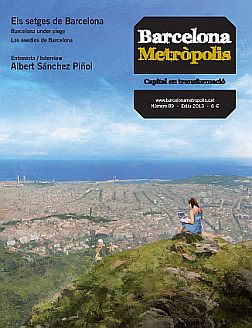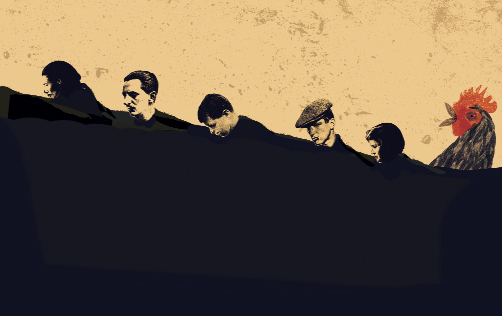In the centenary of Espriu. Fantasy by Julius von Fuck with bassoon and timpani
And Salom says:
«Son of Sinera by volition, compelled to live in this Lavínia, with its Virgilian overtones, the city of Lavínia, brother of King Latinus, or the one founded by Aeneas in honour of his wife, Lavínia, daughter of Latinus, in the times of fusions between natives and newcomers as if foretelling what Rome would be. Far from the urbs, our Lavínia, because we are inside Konilòsia, a country lying between Rarotonga and the Sea of Dreams. The Konilosians, a people of glorious history, rolled, and still do, down a never-ending slope of decadence. They are distrustful, stingy and poor. They treat their collective, spiritual and material heritage with the utmost indifference. They no longer regard themselves as inferior, they now have an attitude of ridiculous sufficiency. The Konilosians never read anything, they know nothing, nothing interests them […] They are envious and wretched, they praise the powerful and the mediocre, they tolerate neither talent nor independence of character.
»Lavínia is a great anarchic and model city, merry and plebeian, the nationalist focus of the Lavínians, a separate group within Konilòsia. They speak a different language and the Konilosian defects are heightened. In Lavínia they dance the most beautiful dance, its literature is sublime and people are aware and totalitarian. There is an underground perhaps half a kilometre long, the world’s largest: they call it the Grand Metro. As Lavínia is an opulent city, it always has a bishop in partibus on stand-by. We are traders, dealing in primary and coarse manufacturing, we practice law, which smears our abundant, vivacious and clever wildlife in oil and grease. We Lavínians are the wealthy ones of Konilòsia, or at least we used to be, before the combined panacea of emigration and tourism.
»In this maze of a city, like so many in history – like Ctesifon – straddling a ridiculed republic and a cruel civil war
- Gorges lascives, pels terrats, [Lewd gullets on the roofs,]
- xisclen desigs propis de gats. [screech cat-like desires].
- Infants de rostres demacrats [Children with gaunt faces]
- roben per fam als plens mercats. [steal out of hunger in
- the busy markets]
- […]
- A trenc d’albada canta el gall, [the rooster crows at the
- break of dawn,]
- entren manobres al treball, [labourers clock in to work,]
- esmorzant trossos de badall. [breakfasting on slices of
- yawns]
- […]
- Menges de fonda o d’ambigú, [tavern fare or buffets,]
- regalimoses d’oli cru, [dripping raw oil,]
- tornen el fetge gros i dur, [make the liver fat and hard,]
- com si el tinguéssiu de cautxú. [as if made of rubber.]
»Evening. Heat. Calm. Some streets away, I soon got lost, amid shouting kids and orange and peanut sellers. Dust, laziness, scuffles, cursing. Refuse raining down from destitute balconies. Mangy, scabby curs fighting over crusts of filth. I walk into the tavern. From behind the counter, a squat, hunchbacked monster rebukes me: “What do you want …?” In the long room, full of tables with stained tablecloths, some thirty sets of leftovers remain. Shouts, the stench of cheap tobacco, knives on cartilage, rhythmic sipping. A silent villain bullies a freckle-faced woman into paying his way. Indifference. The inverted strut ostentatiously past: Verge Folla, Pell i Os, Pitoperume, la Colometa, Faisà Daurat, la Lleona, el Lliri, Crisantem. The waitress reads out their resumes with a woman’s contempt. I take a closer look: And that roasted, foolish, decadent Aphrodite…? Why if it isn’t Josep Sereno! And I leave. In the square I am surrounded by deft-handed rogues, streetwalkers, steaming taverns, and Carnival herds chewing on Cervantesesque pigeon droppings from Terrassa.
- Ah, tristesa, tristesa, [Oh, sorrow, sorrow,]
- ulls meus, terra envilida, [my eyes, debased land,]
- ran del mar! A les ombres [by the sea! In the hesitant]
- vacil·lants que s’apleguen [shadows that now gather]
- ara a l’entorn, començo [round me, I begin]
- a recordar l’antiga [to recall the ancient]
- dignitat, amb paraules [dignity, in the words]
- d’aquesta llengua morta: [of this dead language:]
- carreus d’esforç i pena [stones hewn of effort and
- sorrow]
- que bastiran la nova [that will build the new]
- ciutat de les lloances. [city of praise.]
»I walked out, restless, hastening, not daring to look back, from the showing of M, when I run into Secundina Llopart, the doorwoman of the building in carrer Diputació where my parents lived when they came to Lavínia in 1915. Still nervous, Secundina complains that a young thief has nicked “thirty pesetas” from her (“I’m shaken up! I even had to sit down and have a cup of tea!”). I ask about the Ginebredes sisters. “Magdalena Blasi used to visit, about four or five times a year,” says Secundina, “the modest flat in carrer de la Llanterna, near Plaça del Sol, where those unfortunate people lived. Every day Amelia would go down the stairs to deliver the knitting work she did and stand in line to buy some meat for her sister, confined to bed, who she ended up wishing was dead. When the war was almost upon them, Blasi left them, alone, waiting for death, along with the priest, the carpenter, the young married couple and the owners (when they weren’t out of town) who lived in their building.”
- Un fagot, un patètic [A bassoon, a pathetic]
- violí, a la dansa [violin, in the suburban]
- suburbana dels tristos [dance of sad]
- morts amics. Més profundes, [deceased friends.]
- amb excessiu missatge [the trumpets of judgment ring
- out even deeper,]
- de premi o de condemna, [their message either over
- congratulatory,]
- trompetes del Judici. [or passing unfair sentence.]
»According to Emmeline, who one day will be immortal for that memorable utterance, “No matter who runs the show, one always ends up being the doorwoman”, I see Efrem Pedagog, E(s)colampadi Miravitlles, Pura Yerovi and, surprise surprise, Magdalena Blasi. “What a glorious sunny day!” murmured, climatologically, the old lady. “And isn’t life strange! Just when I was enjoying myself, the poor man goes and dies in mid-puppet show in the street… I will say an Our Father for him… Those men were wise…” And Miravitlles clarified: “We were arguing with an expert on Cervantes about the number of demons that the Altisidora in Don Quixote saw at the gates of hell, when the man dropped dead, the gloves of Altisidora and the Devil on his hands.” Secundina, always lucid, prayed for the deceased puppeteer: “This fellow’s number isn’t coming up at the bingo, that’s clear. And it’s a good job yours truly didn’t have it on her card. The way things are now, if you miss your shot, you’ve had it.” The young Pura Yerovi, of generous bosom, reflected, as she walked away, on the little orphan who was helping the dead man: “And that poor soul! An abandoned child…! So much misery…! It’ll make me feel ill!” But Mrs Magdalena Blasi, impartial, took over: “Well just look at that, I’m beginning to feel peckish…”
- A Ctesifon i altres ciutats, [In Ctesifon and other cities,]
- pobres i rics, prou barrejats, [rich and poor, fairly mixed,]
- cremen el foc dels set pecats, [they burn the fire of seven sins,]
- davant la mort que els ha engendrats. [in the face of death that engendered them.]
- Velles malignes d’ulls glaçats [Evil old women with frozen eyes]
- dicten darreres voluntats [dictate last wishes]
- contra parents esperançats. [against expectant relatives.]
- I aquell que resta ja es compon, [And those who remain will find a way]
- a Vic, a Reus i a Ctesifon.» [in Vic, Reus and Ctesifon.]





